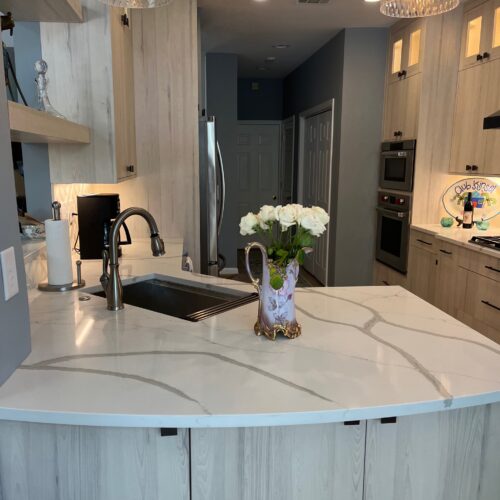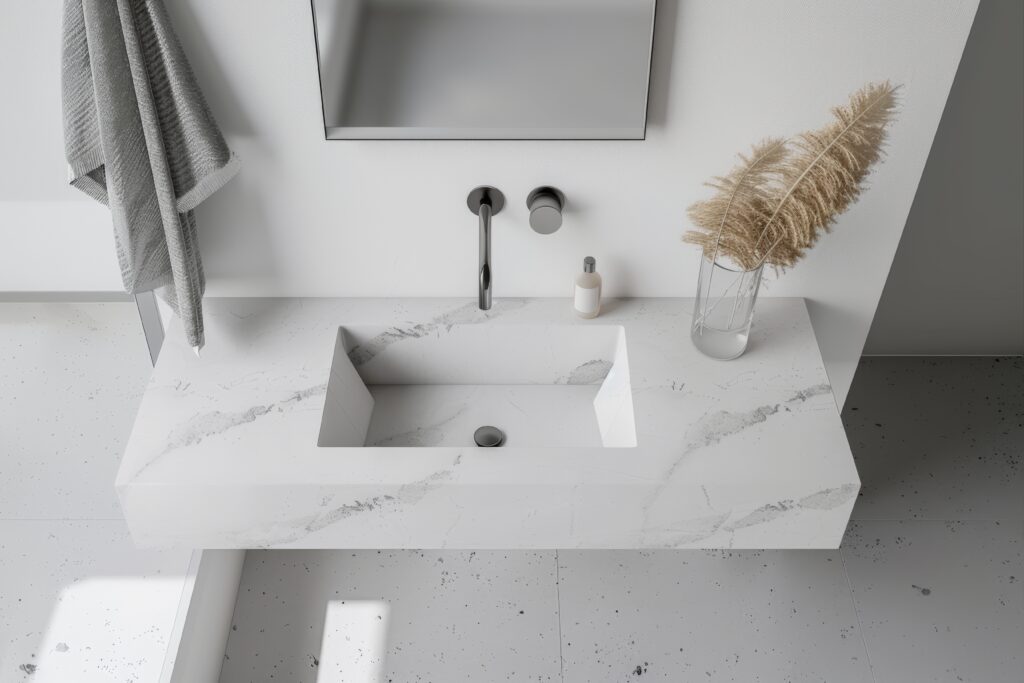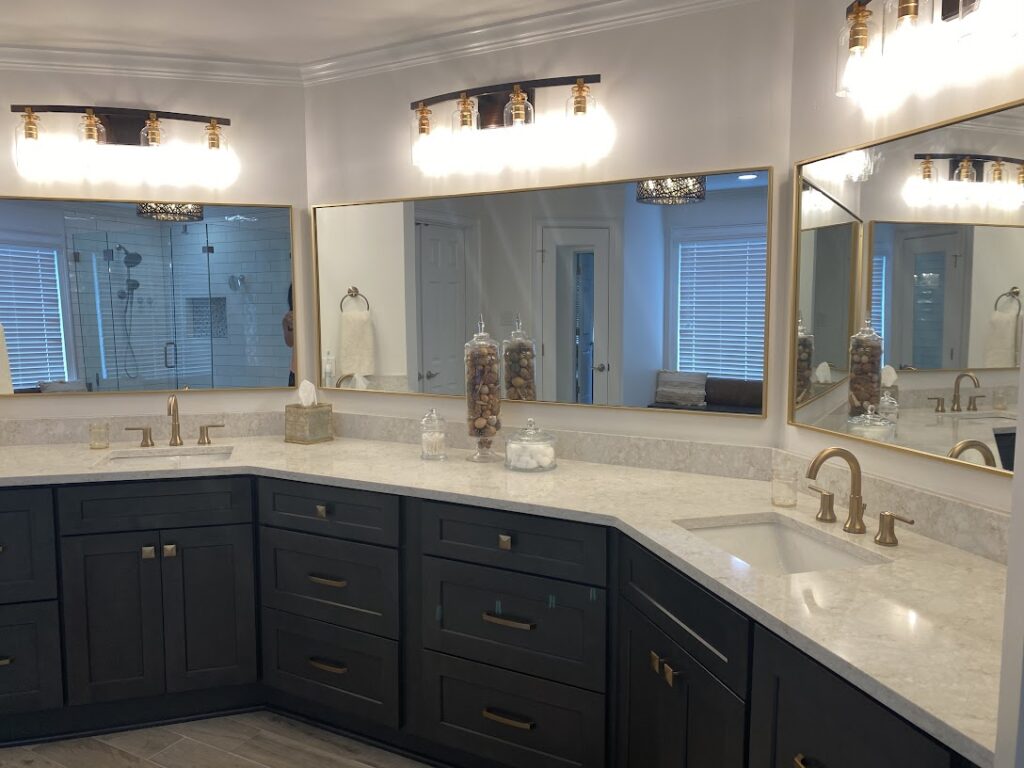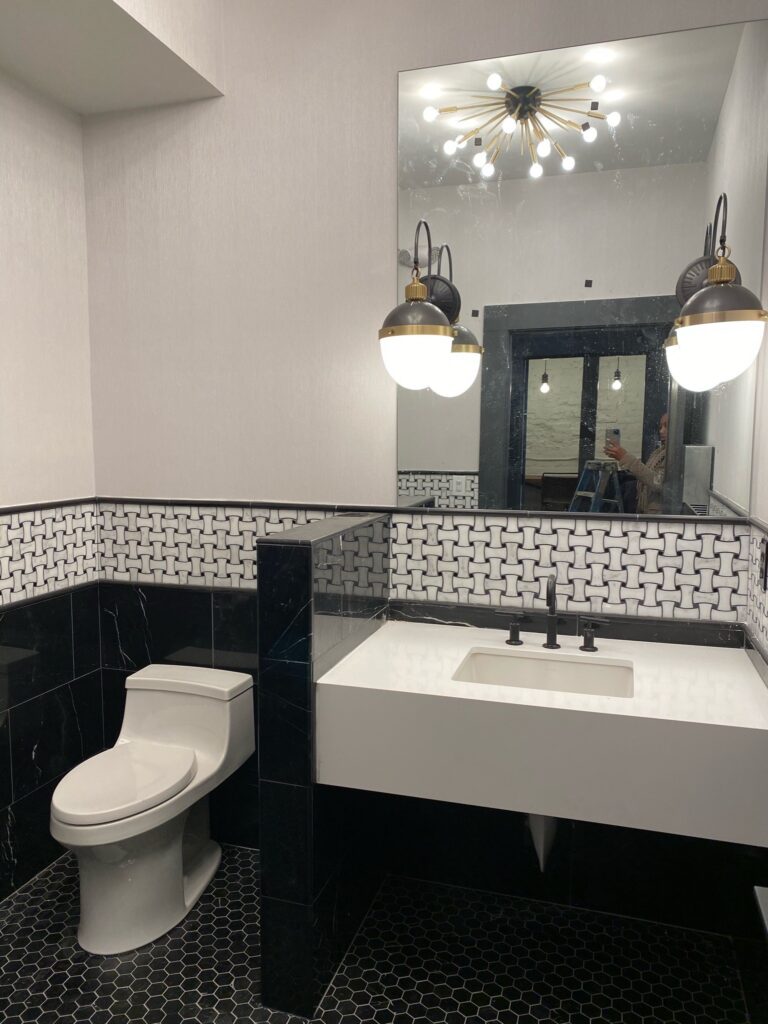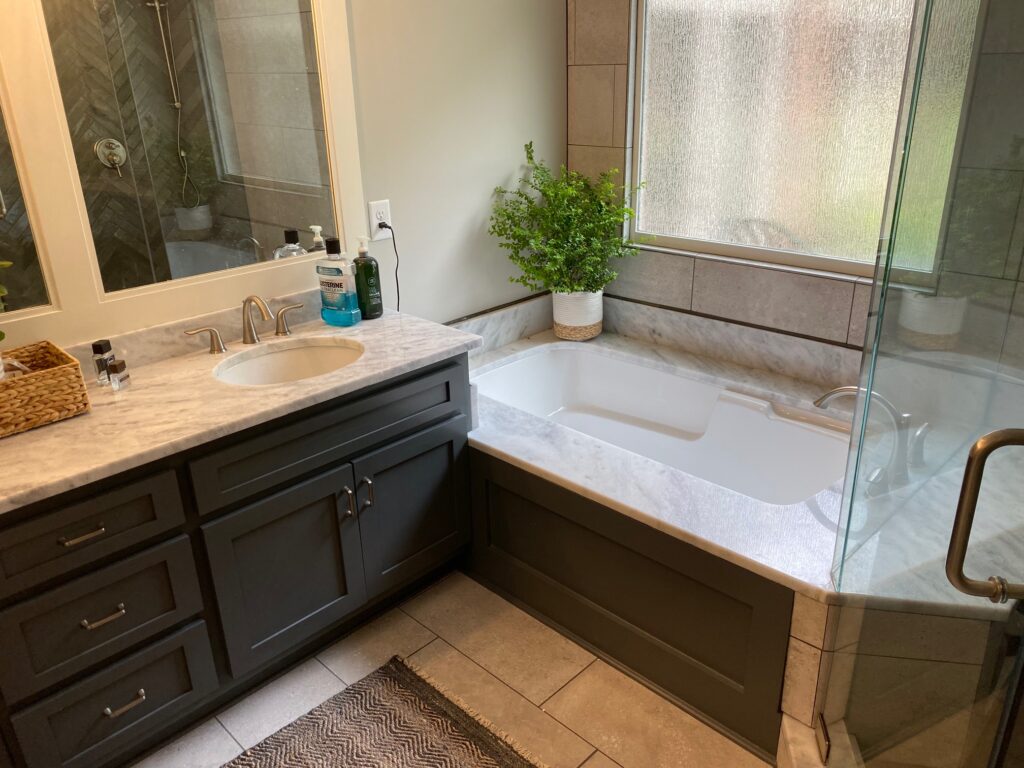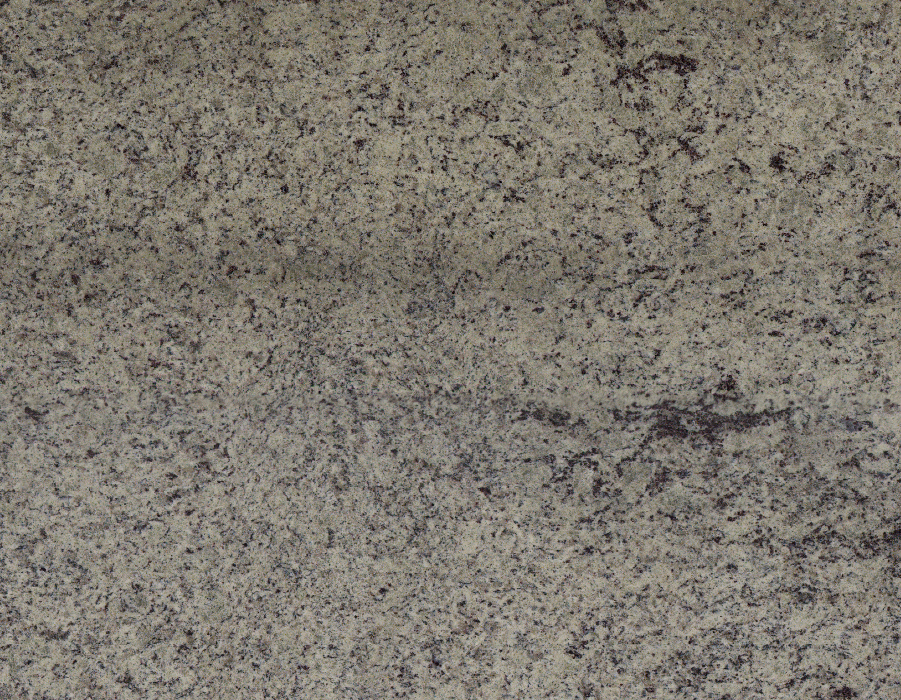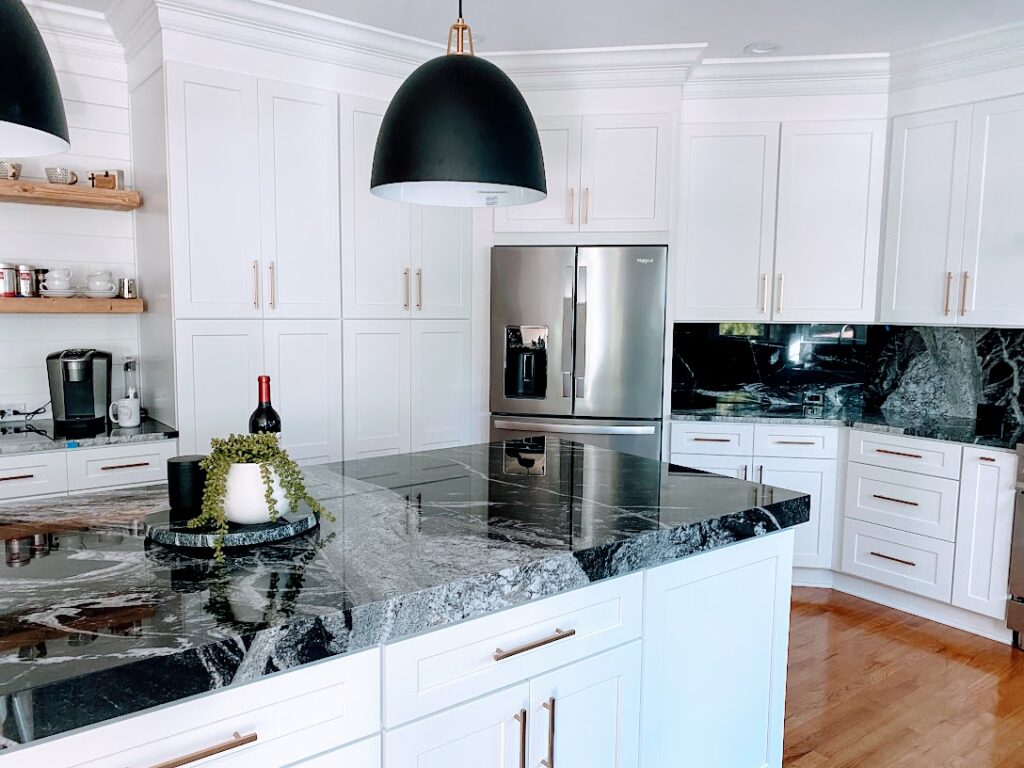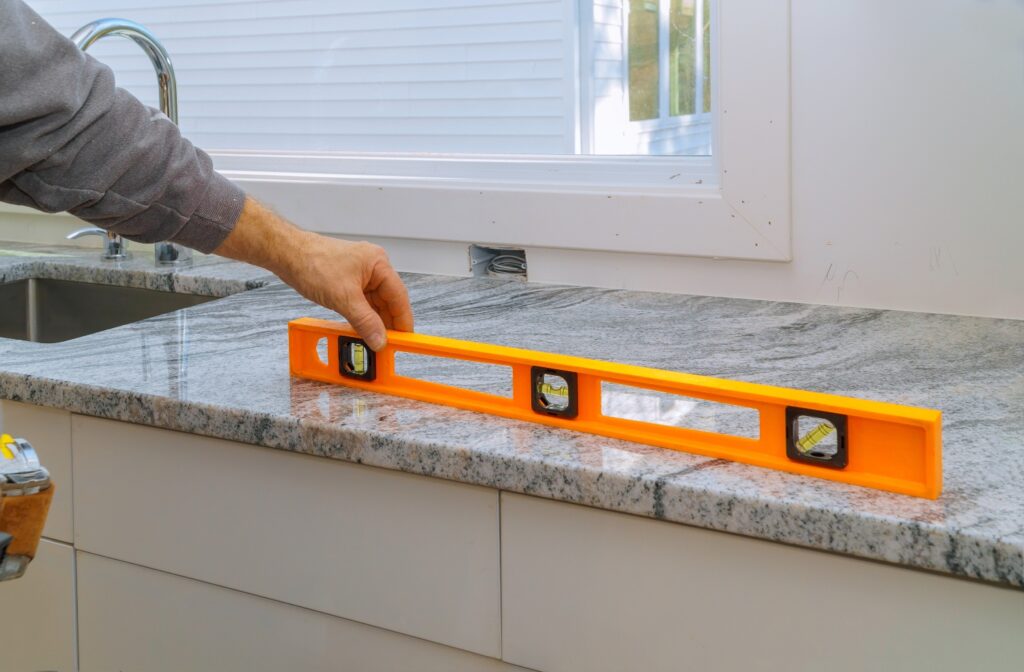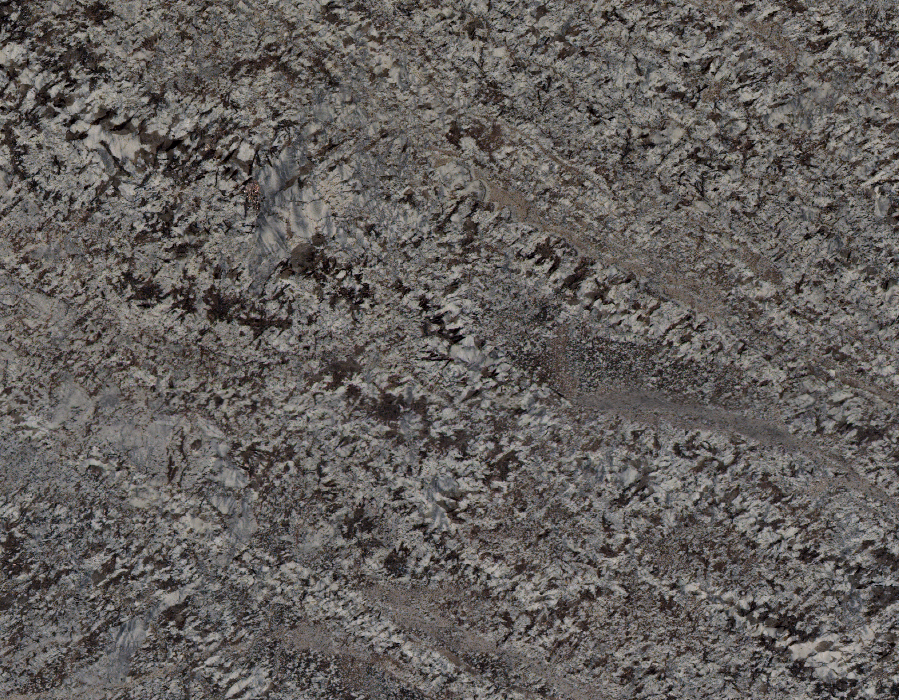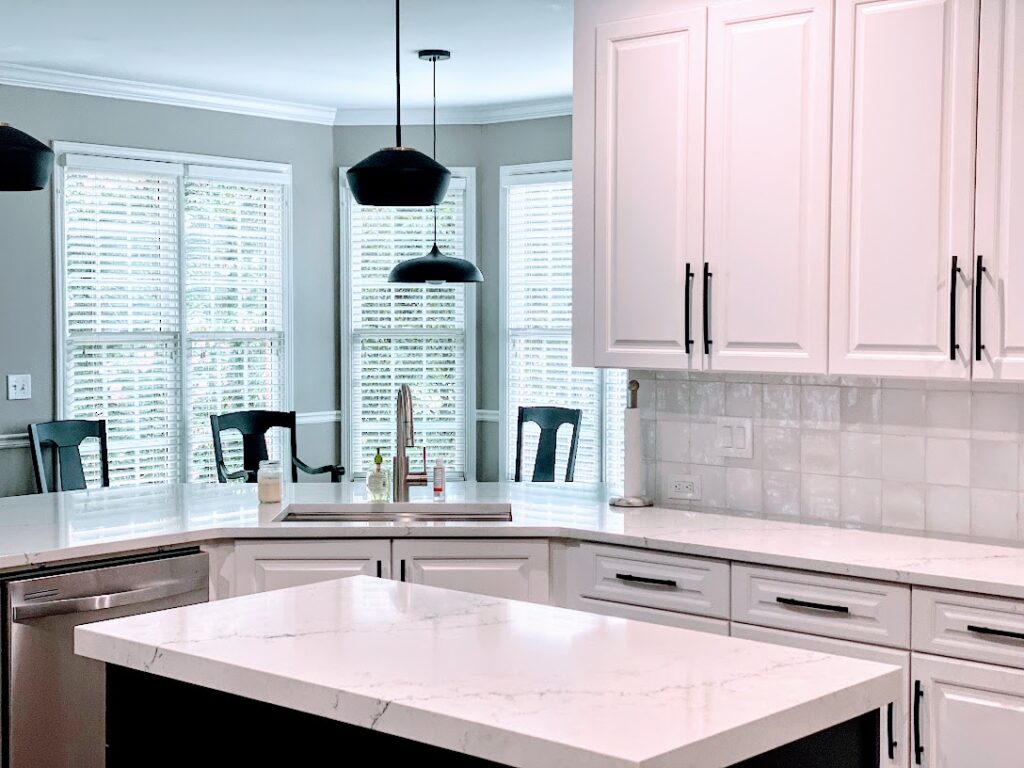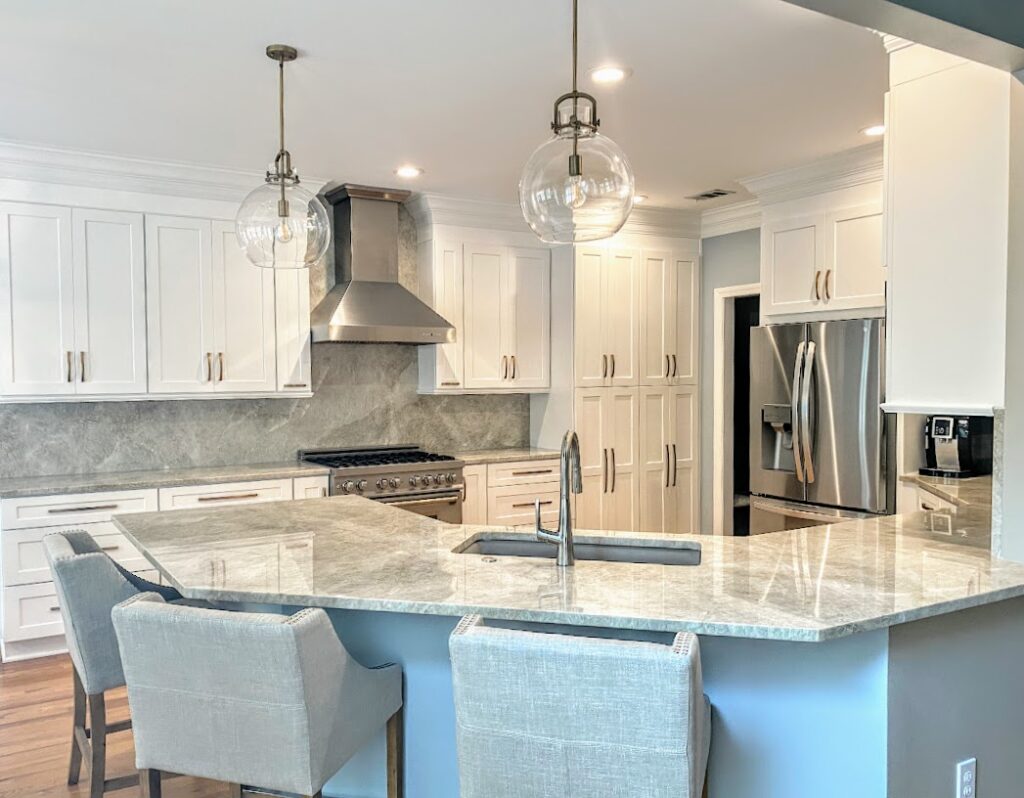Quartz Countertops vs. Wood Countertops (Butcher Block)
When choosing between quartz and wood countertops, you face a fascinating decision that blends practicality with aesthetics. Quartz countertops offer unmatched durability and low maintenance, ideal for a busy lifestyle, while wood countertops, particularly butcher block, bring a warm, rustic charm that can transform a kitchen’s atmosphere. But don’t just focus on looks—consider the maintenance each requires and how the costs stack up over time. As you weigh these factors, you’ll uncover which material suits your needs and how each can shape the heart of your home in distinctive ways.
Material Composition
Understanding their material composition is key when choosing between quartz and wood countertops.
Quartz countertops are engineered from a mix of natural quartz crystals and resins. This blend is molded into slabs and polished to a high-gloss finish. The result is a non-porous surface that’s consistent in color and pattern. The manufacturing process allows for a wide range of colors and designs, some of which mimic the appearance of natural stone.
Quartz’s composition makes it resistant to stains and bacteria, as there are no pores or cracks for spills to seep into.
On the other hand, wood countertops, often referred to as butcher blocks, are crafted from pieces of wood glued together to form a solid surface. The wood used can vary from maple, oak, cherry, to walnut, each bringing its unique grain patterns and warmth to your kitchen space.
Wood countertops are typically sealed with oils or finishes to protect against moisture and enhance their natural beauty. However, they require regular maintenance to keep them looking their best and to prevent water damage.
Durability Comparison
After exploring the material composition of quartz and wood countertops, let’s examine their durability.
Durability is a key factor when choosing a countertop, as it affects how well it will withstand daily use, spills, and potential damage.
Quartz countertops are well-known for their exceptional durability. Made from engineered stone, quartz is non-porous and resistant to stains, scratches, and heat. You don’t have to worry about leaving a hot pan on your quartz countertop; it won’t scorch easily. Its non-porous nature also means it won’t harbor bacteria or require sealing, providing a long-lasting and hygienic surface.
Conversely, wood countertops, especially butcher block, offer a different kind of durability. Wood is naturally resilient and, when properly maintained, can withstand daily wear and tear.
However, wood is more susceptible to scratches and dents, especially if you’re cutting directly on the surface. Moreover, wood is porous, which makes it prone to staining and water damage if spills aren’t promptly cleaned. This porosity can also lead to bacteria growth if not properly managed.
Yet, many appreciate the character that wood develops over time, with natural imperfections adding to its charm.
Maintenance Requirements
Maintenance is a crucial aspect to consider when selecting between quartz and wood countertops. If you’re looking for a low-maintenance option, quartz might be your best bet.
Quartz countertops are non-porous engineered surfaces, which means they don’t absorb liquids and are resistant to stains. This characteristic makes them incredibly easy to clean—just wipe them down with a damp cloth and mild soap. Unlike natural stones, you won’t need to worry about sealing them annually.
On the other hand, wood countertops, commonly known as butcher blocks, require a bit more attention. They’re porous and can absorb liquids, so spills must be cleaned up promptly to prevent stains and bacterial growth.
To maintain their protective layer, you’ll need to apply a food-safe mineral oil or sealant regularly, usually every month or so. This treatment helps prevent drying, cracking, and warping, ensuring the wood remains in good condition.
You’ll also want to be cautious with heat and moisture around wood countertops. Always use trivets or hot pads to protect the surface from hot pots and pans, and avoid leaving wet items on the surface for extended periods.
Quartz is more forgiving with heat but still requires some care, as extreme temperatures can cause thermal shock.
Ultimately, the choice between quartz and wood countertops depends on how much time and effort you will invest in their upkeep. Quartz offers ease and convenience, while wood provides a warm, rustic charm with a bit more hands-on care.
Cost Analysis
While considering the upkeep of quartz and wood countertops, it is important to evaluate their cost implications. The initial investment and long-term expenses can significantly influence your decision.
Quartz is engineered, non-porous, and durable, which can justify its higher price point. It requires minimal maintenance, saving you money on upkeep over time.
While they might initially seem more budget-friendly, remember that they require regular sealing and oiling to maintain their appearance and functionality. These maintenance tasks can add to the overall cost in the long run.
However, if you’re handy and willing to do the upkeep yourself, you could manage these expenses more economically.
When comparing the two, consider the upfront costs and the potential for repairs and replacements. Quartz is less likely to suffer from scratches, stains, or water damage, reducing the likelihood of costly repairs. Wood countertops, in contrast, are more prone to these issues, which could mean additional investments over time to keep them looking their best.
Ultimately, your budget and willingness to maintain your countertops will dictate your best choice. Weighing initial and long-term costs will help you make an informed decision that aligns with your financial and lifestyle preferences.
Aesthetic Appeal
Step into the world of countertops, and you’ll find that aesthetic appeal often takes center stage in decision-making. It’s not just about functionality; it’s about transforming your kitchen or bathroom into a visual masterpiece.
When choosing between quartz and wood countertops, each offers a distinct look that can dramatically alter the ambiance of your space.
Quartz countertops bring a sleek, modern vibe to any room. With a wide array of colors and patterns, from subtle whites and grays to bold, striking hues, quartz offers versatility to complement contemporary and traditional designs.
The uniformity in pattern ensures a polished, cohesive look throughout your kitchen or bathroom. If you’re aiming for a clean, sophisticated appearance, quartz might be your go-to.
In contrast, wood countertops, often referred to as butcher blocks, introduce warmth and character. Each piece of wood has a unique grain pattern and color variations, lending a natural, rustic charm to your space.
This organic feel can create a cozy, welcoming atmosphere that’s hard to replicate with man-made materials. Wood’s natural beauty is unrivaled for a farmhouse or cottage-style kitchen.
Consider your style preferences and the overall mood you want to set. Do you prefer the pristine and uniform or the imperfect beauty of nature?
Each option has its own allure and can make a statement in its own right. Your choice will reflect not just your aesthetic preferences but also the environment you want to create in your home.
Frequently Asked Questions
Are Quartz Countertops More Eco-Friendly Than Wood Countertops?
When considering eco-friendliness, consider the production and sourcing of materials. Quartz requires energy-intensive processes, while wood can be sustainably harvested. Wood is generally more eco-friendly if it’s sourced responsibly. Choose wisely!
Do Quartz Countertops Offer Better Heat Resistance Than Butcher Block?
You’re wondering about heat resistance. Quartz countertops handle heat better because they resist scorching and warping. You can place hot pots directly on them, unlike wood, which can get damaged. So, choose quartz for superior heat endurance.
Can Butcher Block Countertops Be Customized in Shape and Size Like Quartz?
Yes, you can customize butcher block countertops in shape and size. They’re versatile and can be tailored to fit your unique kitchen layout, allowing you to create a personalized look that matches your design preferences perfectly.
How Do Quartz and Wood Countertops Impact Indoor Air Quality?
You’re concerned about air quality. Quartz countertops don’t emit volatile organic compounds, so they’re safe. Wood might release VOCs, especially when treated. Ensure proper sealing and ventilation to minimize any potential impact on your indoor air.
Are Either Quartz or Wood Countertops Susceptible to Staining From Food or Drinks?
You’re wondering about staining. Quartz countertops resist stains better because they’re non-porous. Wood countertops, however, are more prone to stains from food and drinks. Regular sealing can help, but cleaning spills quickly is essential to prevent damage.
Conclusion
When choosing between quartz and wood countertops, consider your priorities. If you value durability and easy maintenance, you’ll appreciate quartz’s stain resistance and longevity. It may cost more initially, but its low upkeep is a major advantage. On the other hand, if you’re drawn to warmth and rustic charm, wood countertops offer unique grain patterns that can transform your space. Just remember, they need regular sealing and oiling. Ultimately, your choice depends on what suits your lifestyle and aesthetic preferences.

Val Carvalho is a manager at Atlanta Stone Creations, with nearly two decades of experience in the stone and design industry. In addition to her leadership role, Val plays a key part in sales and design, bringing creativity, precision, and a strong sense of style to every project. Known for her warm and collaborative approach, she builds strong relationships with both her team and her clients. Val is passionate about delivering beautiful, high-quality results and creating an exceptional experience from start to finish.

